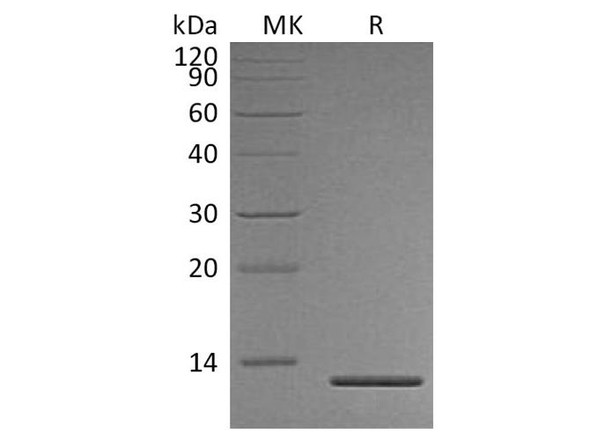Description
| Product Name: | Human PSPN Recombinant Protein |
| Product Code: | RPPB0887 |
| Size: | 20µg |
| Species: | Human |
| Target: | PSPN |
| Synonyms: | Persephin, PSP, PSPN. |
| Source: | Escherichia Coli |
| Physical Appearance: | Sterile Filtered White lyophilized (freeze-dried) powder. |
| Formulation: | Lyophilized from a 0.2�m filtered concentrated solution in PBS, pH 7.4. |
| Solubility: | It is recommended to reconstitute the lyophilized PSPN in 4mM HCl not less than 100�g/ml, which can then be further diluted to other aqueous solutions. |
| Stability: | Lyophilized PSPN although stable at room temperature for 3 weeks, should be stored desiccated below -18°C. Upon reconstitution PSPN should be stored at 4°C between 2-7 days and for future use below -18°C. For long term storage it is recommended to add a carrier protein (0.1% HSA or BSA). Please prevent freeze-thaw cycles. |
| Purity: | Greater than 95.0% as determined by:(a) Analysis by RP-HPLC.(b) Analysis by SDS-PAGE. |
| Amino Acid Sequence: | ALSGPCQLWS LTLSVAELGL GYASEEKVIF RYCAGSCPRG ARTQHGLALA RLQGQGRAHG GPCCRPTRYT DVAFLDDRHR WQRLPQLSAA ACGCGG |
| Biological Activity: | Fully biologically active when compared to standard. The ED50 as determined by a cell proliferation assay using human TT medullary thyroid cancer cells is less than 10ng/ml, corresponding to a specific activity of > 1.0 � 100,000 IU/mg.� |
Persephin is a member of the GDNF ligand subfamily of the TGF-beta superfamily. PSPN encourages the existence and growth of key dopaminergic and motor neurons, as well as taking part in kidney development. Nonetheless, persephin does not support existence of peripheral neurons.
PSPN Human Recombinant produced in E.Coli is a disulfide-linked homodimer containing 2x96 amino acids and having a molecular mass of 20.5kDa. � � � � � � � � ��The PSPN is purified by proprietary chromatographic techniques.
| UniProt Protein Function: | PSPN: Exhibits neurotrophic activity on mesencephalic dopaminergic and motor neurons. Belongs to the TGF-beta family. GDNF subfamily. |
| UniProt Protein Details: | Protein type:Secreted; Secreted, signal peptide Chromosomal Location of Human Ortholog: 19p13.3 Cellular Component: extracellular space Molecular Function:growth factor activity; receptor binding Biological Process: nervous system development; axon guidance; central nervous system development; ureteric bud branching |
| NCBI Summary: | The protein encoded by this gene is a neurotrophic factor, belonging to the GDNF family. Neurotrophic factors are important for the proper development and maintenance of the nervous system. These factors promote neuronal survival and can prevent the neuronal degeneration associated with injury, toxin exposure, or neurodegenerative disease. The encoded protein has amino acid similarity to its other family members, glial cell line-derived neurotrophic factor and neurturin. This gene product promotes the survival of ventral midbrain dopaminergic neurons in culture and prevents their degeneration after 6-hydroxydopamine treatment in vivo. [provided by RefSeq, Jul 2008] |
| UniProt Code: | O60542 |
| NCBI GenInfo Identifier: | 7531178 |
| NCBI Gene ID: | 5623 |
| NCBI Accession: | O60542.1 |
| UniProt Related Accession: | O60542 |
| Molecular Weight: | 16,600 Da |
| NCBI Full Name: | Persephin |
| NCBI Synonym Full Names: | persephin |
| NCBI Official Symbol: | PSPN�� |
| NCBI Official Synonym Symbols: | PSP�� |
| NCBI Protein Information: | persephin |
| UniProt Protein Name: | Persephin |
| Protein Family: | Persephin |
| UniProt Gene Name: | PSPN�� |
| UniProt Entry Name: | PSPN_HUMAN |








